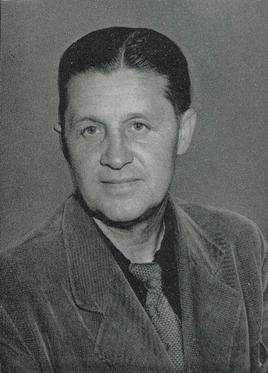Francis J. McCormick facts for kids

McCormick pictured in The Hinakaga 1951, Carroll yearbook
|
|
| Biographical details | |
|---|---|
| Born | 1903 Antigo, Wisconsin, U.S. |
| Died | August 13, 1958 (aged 55) Milwaukee,Wisconsin, U.S. |
| Playing career | |
| Football | |
| 1924–1925 | Marquette |
| Basketball | |
| 1924–1926 | Marquette |
| Position(s) | Back (football) Forward (basketball) |
| Coaching career (HC unless noted) | |
| Football | |
| 1934–1942 | St. Norbert |
| 1949–1957 | Carroll (WI) |
| Basketball | |
| 1934–1943 | St. Norbert |
| 1944–1945 | St. Norbert |
| Head coaching record | |
| Overall | 69–57–9 (football) 62–74 (basketball) |
Francis J. "Mickey" McCormick (1903 – August 13, 1958) was a well-known American football and basketball player and coach. He coached football at St. Norbert College from 1934 to 1942. Later, he coached at Carroll College (now Carroll University) in Waukesha, Wisconsin from 1949 to 1957. His total football coaching record was 69 wins, 57 losses, and 9 ties. McCormick also coached basketball at St. Norbert from 1934 to 1943, and again in 1944–45. His basketball coaching record was 62 wins and 74 losses. He was known for speaking out against a rule change in college football called "free substitution" in 1953.
Contents
Early Life and Education
Mickey McCormick grew up in Antigo, Wisconsin. He graduated from Antigo High School in 1929.
Playing Sports in College and Beyond
Playing at Marquette University
McCormick played both college football and basketball at Marquette University. He was a forward on the basketball team. His football teams had some great moments, like beating Navy 21–3 in 1924. In 1925, the team finished with a strong record of 7 wins and 2 losses. Their coach, Frank Murray, is now in the College Football Hall of Fame.
Playing in the NFL
After finishing college at Marquette, McCormick went on to play professional football. He was a member of the Duluth Eskimos, a team in the National Football League (NFL).
Coaching Career Highlights
Coaching at St. Norbert College
McCormick started his coaching career at St. Norbert College in De Pere, Wisconsin. He coached football there from 1934 to 1942. During his time, the Green Knights football team had a record of 32 wins, 26 losses, and 8 ties. One of their best seasons was in 1936, when they won 7 games and lost only 1. Besides football, McCormick was also the head basketball coach at St. Norbert.
Coaching at Carroll University
McCormick became the head football coach at Carroll College in 1949. He coached there for nine seasons, until 1957. His record at Carroll was 37 wins, 31 losses, and 1 tie. Carroll was his last coaching job because he passed away in August 1958, right before the new season began.
Carroll University later honored him by adding him to their "Athletic Hall of Fame." This was to recognize his important contributions to the school's sports programs. One of the highlights of his coaching at Carroll was the strong offense his team had in the 1951 season.
McCormick started the 1949 season with twenty eager players. He thought they were "strong on talent but weak on depth." Team practices began in early September that year. He believed his most talented team was in 1955, calling them the best Carroll had in ten years. McCormick was also chosen to coach the "South" team in the 1951 Upper Peninsula All-Star Football exhibition game.
Speaking Out on "Free Substitution"
In 1953, a new rule called "free substitution" was being discussed in college football. This rule allowed players to go in and out of the game more freely. It was already common in professional football and helped create "specialist athletes." These are players who focus on one specific position, like a quarterback or a punter.
While this rule worked well for large colleges and professional teams, McCormick spoke out against it for smaller colleges. He explained that smaller schools would struggle with this rule. Free substitution usually meant a player couldn't return to the game in the same quarter if they were taken out. This meant teams needed either a very large group of players to handle all the changes or a small, super-talented team that wouldn't need to substitute much. McCormick felt this put smaller colleges at a disadvantage.
Death
Francis J. McCormick passed away on August 13, 1958. He died at St. Joseph's Hospital in Milwaukee, Wisconsin.
 | James Van Der Zee |
 | Alma Thomas |
 | Ellis Wilson |
 | Margaret Taylor-Burroughs |

